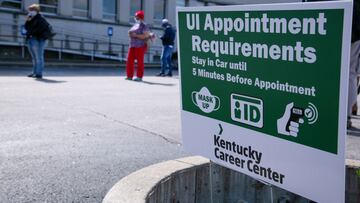Overpayment of unemployment benefits: should I give it back?
There are a number of reasons you may receive more unemployment compensation than you were due. Depending on the circumstances you may need to pay it back.

The covid-19 pandemic brought the US economy to a grinding halt in the spring of 2020, throwing millions of Americans in to unemployment.
Roughly 40 million people received unemployment benefits in 2020, according to a Century Foundation report. The federal government stepped in to provide a backstop to state jobless aid.
- IRS shooting for May to send refunds to those receiving jobless aid tax break
- What are the maximum unemployment benefits per state?
- A new proposal to revamp unemployment systems
- What's the deadline for states to choose to offer $10,200 unemployment tax break?
New federal programs beef up state benefits
With the passing of the CARES Act, new federal pandemic unemployment benefits were created which allowed those who normally aren’t eligible to claim benefits, extended benefits for long-term unemployed workers and provided an extra $600 per week. Follow-up covid-19 relief bills and executive orders have seen these programs continued with the weekly top-up being reduced. All the federal jobless aid programs are currently set to expire in September.
For many Americans it was their first time dealing with their state unemployment offices and there was confusion about how to claim benefits. Additionally, state unemployment insurance offices were swamped with workers seeking financial aid to help them weather the storm causing antiquated systems to buckle under the strain. This all led to cases where some people received benefits that they weren’t eligible for and they might need to be paid back to the state.
He Made a Minor Mistake Filling Out an #Unemployment Form. Then the State Demanded $14,990 From Him. #overpayment https://t.co/ZVWCvoveau
— Andrew Stettner (@pelhamprog) October 29, 2020
Reasons for overpayment of unemployment compensation
An overpayment of jobless aid occurs when you receive unemployment compensation you were not eligible for. You could have been overpaid because of an error or you claimed benefits you were not supposed to. This may be due to:
- You made a mistake when claiming benefits.
- A job separation issue
- Correction of base period wages
- An audit of your account
- You did not complete the required work search activities.
- Your former employer contested your claim and an appeal decision finds you ineligible for benefits you have already been paid
- You committed fraud if you knowingly misrepresent or fail to disclose requested information, or by making false statements (whether intentional or not) to receive benefits.
In most cases, you will be required to repay the unemployment compensation that was overpaid. However, you may be able to appeal and get a waiver to avoid repaying all or some of the benefits you received by mistake.
How will I know if I’ve been overpaid?
You will typically receive in writing a letter from your unemployment office to notify you that you have been overpaid. The notice will state the reason you are getting the overpayment notice. It will also tell you how much you owe and any penalties, if any, and how to repay the amount you have been overpaid. The notice will also include information on how to appeal.
How can I appeal repayment of an unemployment compensation overpayment?
If you believe that the information in the notice is inaccurate, you can appeal the decision. You might be able to apply for a waiver to avoid repayment depending on the reason for the overpayment. In most states, you are entitled to a hearing to review your appeal.
You will have to act within the time granted that will be stated in the letter. You can check how to contact your state unemployment office to get instructions specific for your state.
Some Marylanders receiving unemployment benefits get overpayment notices https://t.co/HUtsvfqIup
— WBAL-TV 11 Baltimore (@wbaltv11) February 24, 2021
The state may pursue a collection process if the money is not repaid
There are different ways that you might be able to repay any over payment. If you are able to pay the full amount you may be asked to send a check for the sum of the overpayment. But if you can’t make the whole payment all at once, you may be able to negotiate a payment plan.
Related stories
If you do not make adequate arrangements for repayment, the state may seize the money you owe from lottery winnings or tax refunds. In some cases, the state may deduct the money from current unemployment compnesation if you are still receiving benefits or garnish your paycheck if you have returned to work.
In the case of fraud, you may be charged a penalty and possibly charged with criminal fraud. Additionally, you may be banned from collecting future unemployment benefits for a certain amount of time depending on the type of fraud.


